
Imaging Services Education
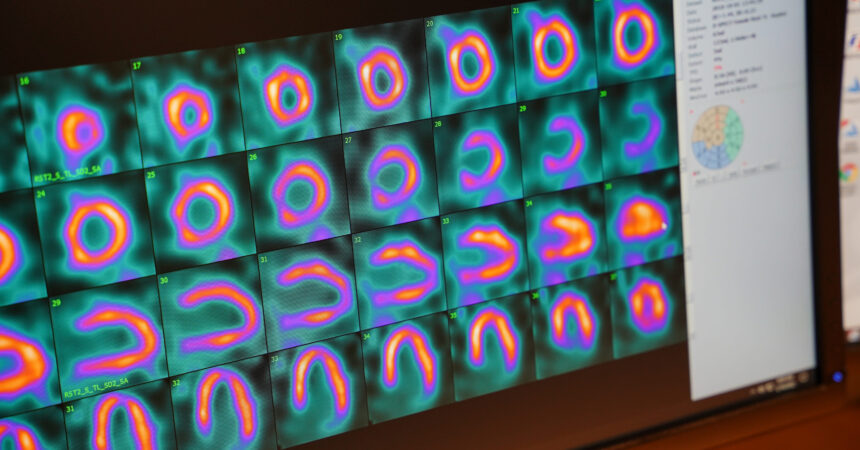


-
Echo/Stress Echo
-
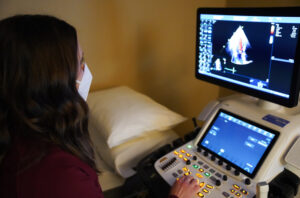
What is an Echocardiogram?
An echocardiogram uses high-frequency sound waves to produce images of your heart. This common test allows your doctor to see your heart beating and pumping blood. Ultrasound does not utilize any radiation to produce images.
What to expect for your Echocardiogram
An ultrasound technologist (sonographer) spreads gel on a device (transducer). The sonographer presses the transducer firmly against your skin, directing an ultrasound beam through your chest to your heart. The transducer records the sound wave echoes from your heart. A computer converts the echoes into real time moving images on a monitor. This ultrasound requires no preparation and takes approximately 45 minutes to 1 hour.
How to prepare for your Echocardiogram
No special preparations are necessary for a standard echocardiogram. You can eat, drink and take medications as you normally would.
What is a Stress Echocardiogram?
Ultrasound images of your heart are taken before and immediately after you walk on a treadmill or if you are unable to exercise, you would receive a medication to make your heart pump as if you were exercising.
How to prepare for your Stress Echocardiogram
- You will want to refrain from having anything to eat 2 hours prior to the procedure.
- A nurse will be in contact with you to go over your current medications
- You can wear or bring comfortable clothes and walking shoes.
- Please drink at least 2 cups of water at least 2 hours before the procedure
Ultrasound Enhancing Agents
You may receive an ultrasound enhancing agent. The enhancing agent, which is generally safe and well tolerated, will enhance the contrasting of arteries of your heart during imaging, which traditional ultrasound might not detect.
-
Vascular Ultrasound
-
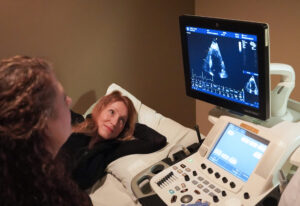
What is a Vascular Ultrasound?
Vascular ultrasound is a noninvasive ultrasound method (also called a duplex study) used to examine the blood flow in various veins and arteries of the body. Common types of vascular ultrasound performed include carotid ultrasound, abdominal aorta ultrasound, lower extremity and upper extremity ultrasounds. Noninvasive means the procedure does not require the use of needles, dyes, radiation or anesthesia.
During a vascular ultrasound, sound waves are transmitted through the tissues of the area being examined. These sound waves reflect off blood cells moving within the blood vessels, allowing the reading physician to calculate their speed. The sound waves are recorded and displayed on a computer screen.
How to prepare for your Vascular Ultrasound
- If you are having an abdominal aorta ultrasound, renal ultrasound or mesenteric ultrasound you’ll need to be fasting for 8 hours prior to the test.
For other vascular testing studies no prep is needed. - Please refrain from smoking and gum chewing 8 hours prior to the exam.
- You can take any prescribed medications but take them with small sips of water.
- If you are having an abdominal aorta ultrasound, renal ultrasound or mesenteric ultrasound you’ll need to be fasting for 8 hours prior to the test.
-
Nuclear Medicine
-
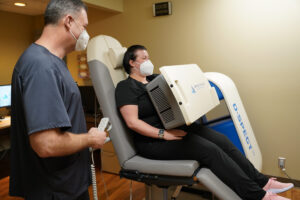
What is a Nuclear Medicine Stress Test?
A nuclear stress test uses a radioactive tracer and an imaging machine to create pictures showing the blood flow to your heart. The test measures blood flow while you are at rest and under exertion, showing areas with poor blood flow or damage in your heart.
The test usually involves injecting radioactive tracer, then taking two sets of images of your heart — one while you’re at rest and another after exertion. If you are not able to exercise adequately, a drug will be injected into your IV that mimics exercise by increasing blood flow to your heart.
How to prepare for your Nuclear Medicine Stress Test
- You will be asked to not eat for 4 hours before your exam.
- You will also want to avoid caffeinated products (chocolate, tea, colas, Excedrin) 12 hours before the test.
- A nurse will be in contact with you to go over medications as some might interfere with certain stress tests.
- You can wear or bring comfortable clothes and walking shoes. Don’t apply oil, lotion or cream to your skin on the day of your nuclear stress test.
What to expect for your Nuclear Medicine Stress Test
First, a nurse will ask you some questions about medical history and how often and strenuously you exercise. This will help determine the amount of exercise that’s appropriate for you during the test.
Before you start the test, an IV will be inserted into your arm and a radioactive tracer will be injected. Once the tracer is injected, you’ll lie still on a table and have your first set of images taken while your heart is at rest.
A nurse will then place sticky patches (electrodes) on your chest which will monitor the electric signals that trigger your heartbeats on an electrocardiogram machine.
If you are not able to exercise, a drug will be injected into your IV line that mimics exercise by increasing blood flow to your heart.
You’ll have another injection of radiotracer when your heart rate peaks. Then you’ll lie still on a table and have a second set of images made of your heart muscle. This will show any areas of your heart receiving inadequate blood flow.
Once the test is complete, you may return to normal activities.
-
Mobile Echo
-
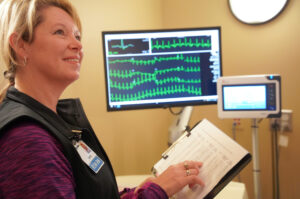
Services where you are, when you need them
Pulse Heart Institute Mobile Echo provides echocardiogram services throughout the Inland Northwest region. We bring mobile diagnostics directly to the patient, where they are – private homes, assisted living facilities, long term care facilities or provider’s offices – using the latest portable digital technology.
We guarantee prompt service and responsiveness. Ordering physicians receive result reports within 48 hours of completion for regular diagnostic procedures and same-day results for urgent examinations.
Our sonographers are credentialed by the American Registry of Diagnostic Medical Sonographers (ARDMS) and Cardiovascular Credentialing International (CCI). Our customers receive professional and compassionate attention to their patients from qualified sonographers.
Our Services Include:
• Echocardiogram
• Holter Monitor
• Electrocardiogram (EKG)
• Same-day exams on request
• All echocardiograms are interpreted by board-certified cardiologistsWe accept health plans offered by most major insurance carriers, including Medicare.
To learn more about our mobile echo services, contact us at 509-755-6900.
